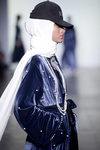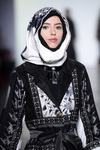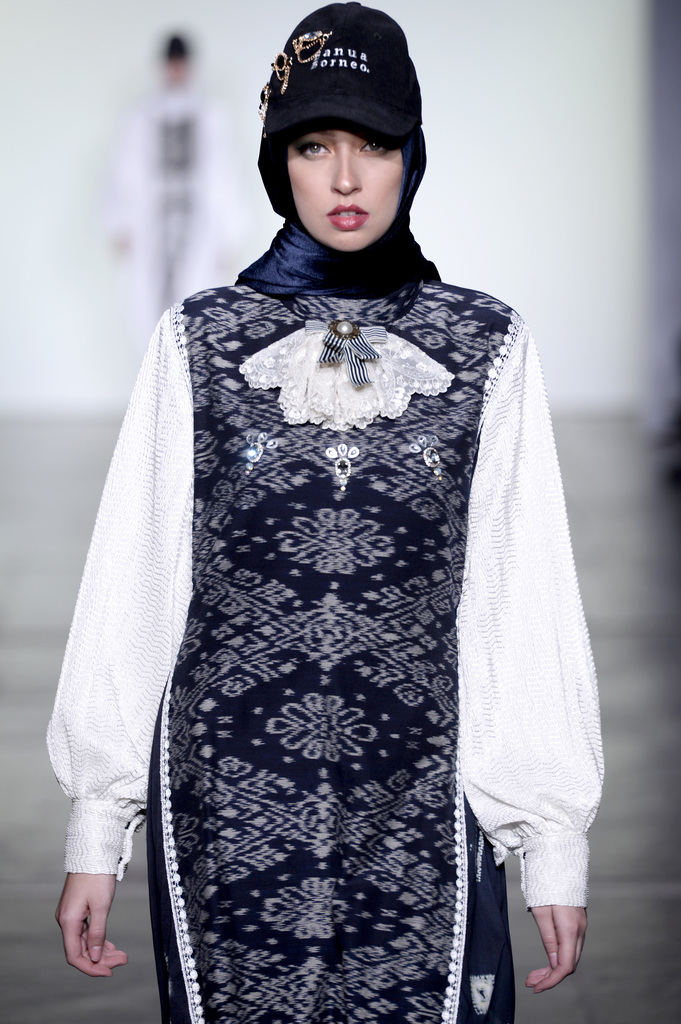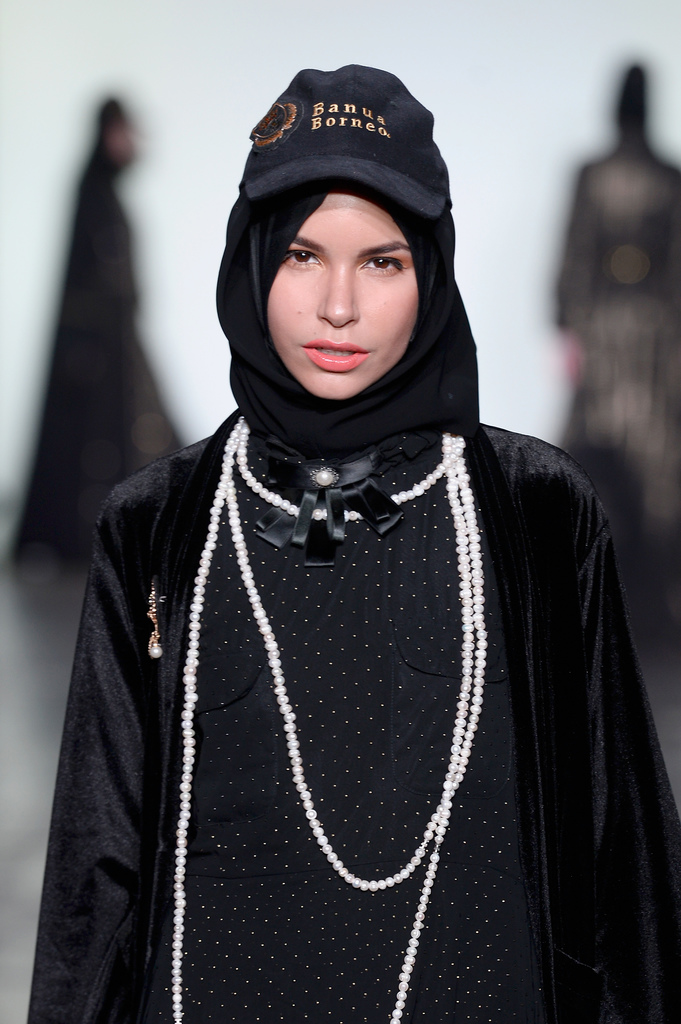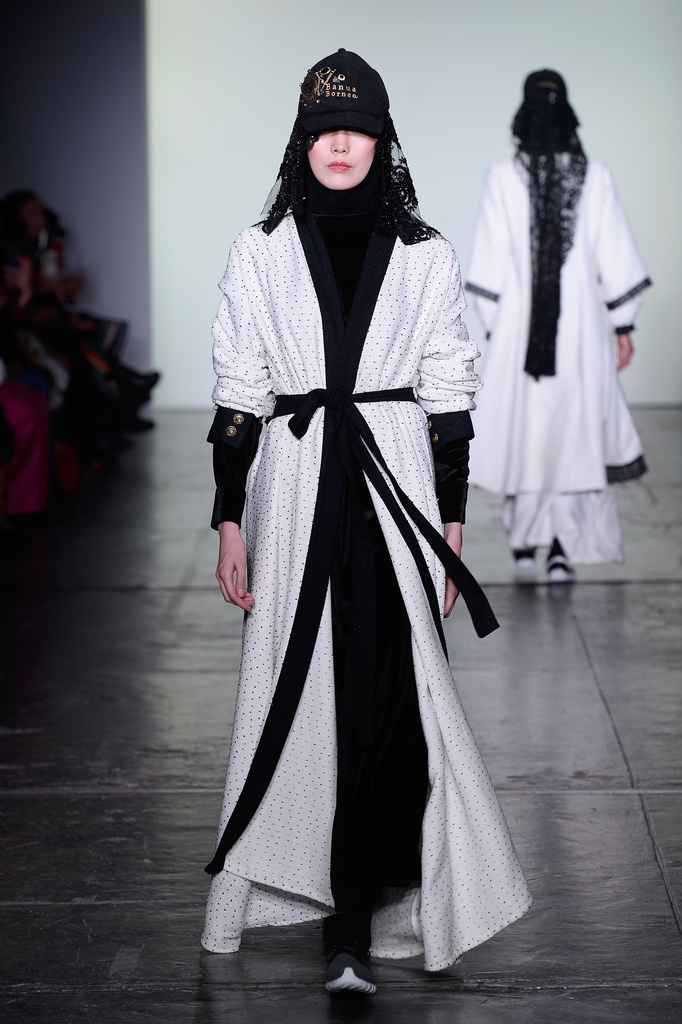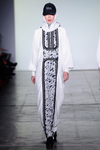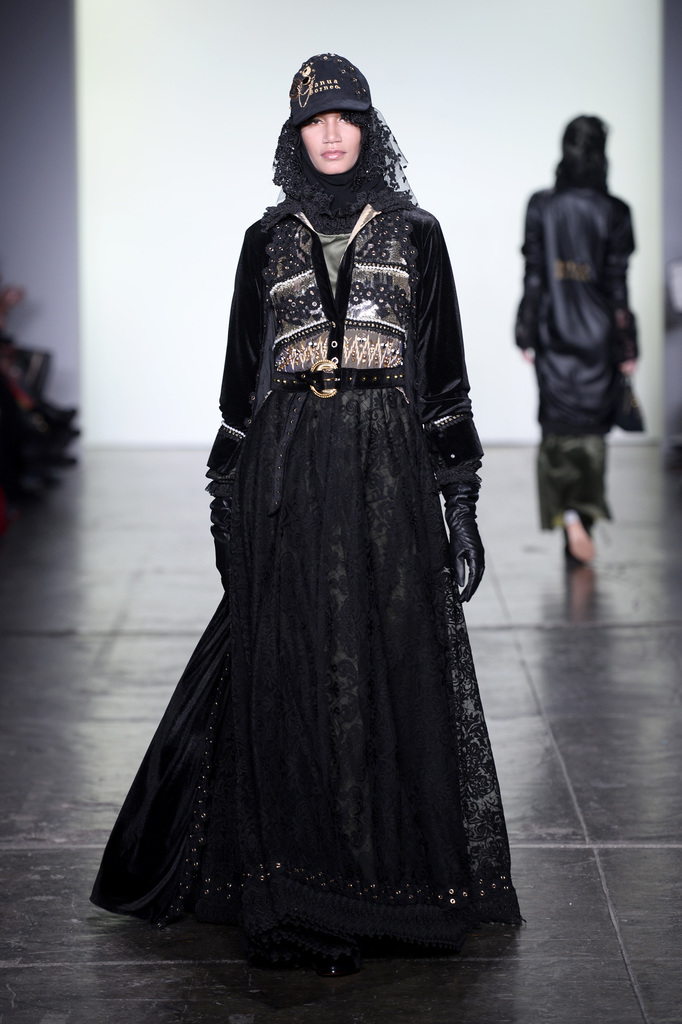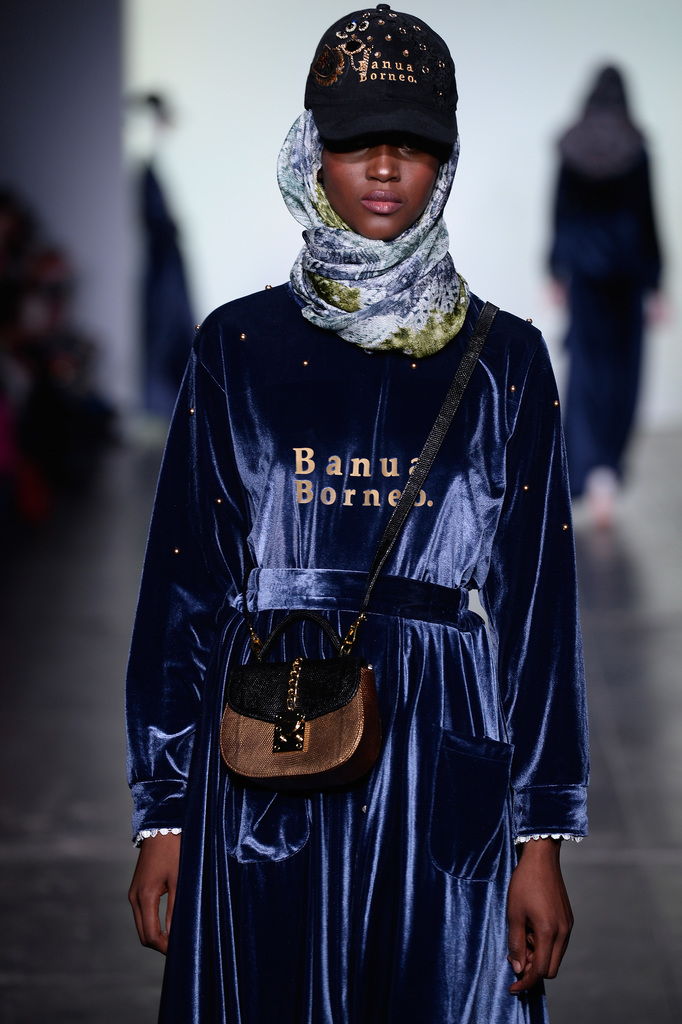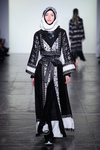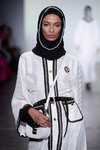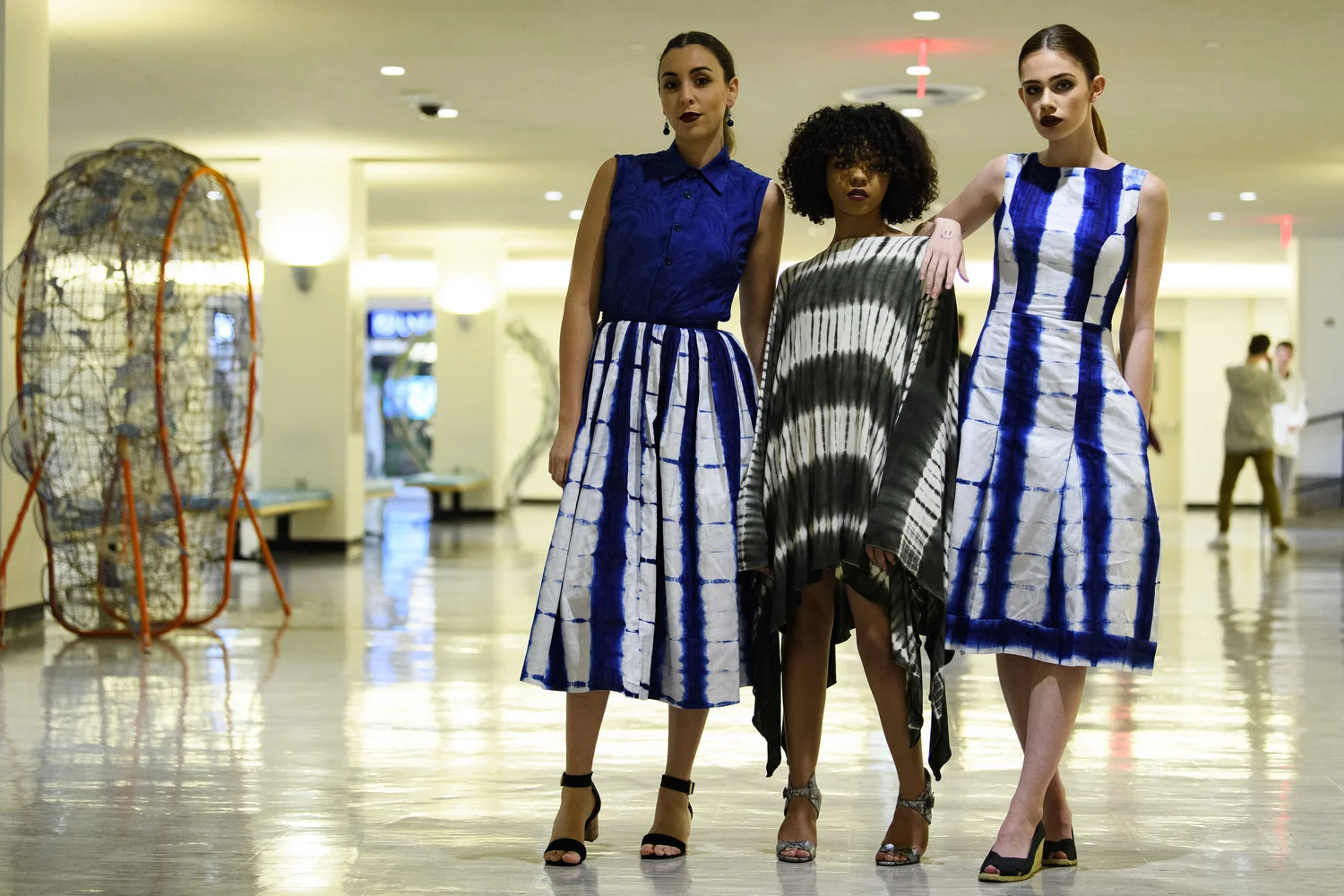New York, NY (February 11, 2018) — Vivi Zubedi brought her signature modest wear to the mainstream with her Fall/Winter 2018 collection runway show at Industria as a part of NYFW: The Shows. The fashion designer traveled from her home country, Indonesia, to display her embellished, statement RTW and hijab collection to the US fashion industry.
The venue was packed with a stylish crowd chattering as the designer and her models prepared to make their mark. Guests were wowed as theatrical beats pumped through the room and the first model walked the catwalk impeccably adorned by handcrafted Indonesian elements.
Zubedi's talent for combining textures, patterns, and embellishments was apparent. The designer mixed traditionally Muslim silhouettes like hijabs and abayas with sportswear elements like printed sneakers and gold embellished baseball caps. Written across the caps and select velvet jumpers in the collection was "Banua Borneo"-- a region of Indonesia that Vivi Zubedi wishes to bring attention to.
The FW18 collection, entitled Urang Banua, was originally crafted as a cultural statement for quality of life and economic welfare of weavers and fabric artisans in the area of South Kalimantan: Pagatan and Sasirangan. As an entrepreneur herself, Vivi has made it her mission to support other entrepreneurs especially these women in South Kalimantan.
Vivi Zubedi's collection utilized the weavers' beautiful original fabrics from South Kalimantan. The difficult techniques used in the process of making these fabrics is what makes them so special. The human resources who created the traditional fabrics are women ranging from teenagers, to adults and elders. Vivi believes these women should be highly praised as they conserve Kalimantan’s traditions. Vivi dreamt to improve the economy of these entrepreneurs by introducing Kalimantan’s traditional fabric to the international fashion industry at NYFW.
“When I saw the elderly weavers in the village in South Kalimantan, I suddenly wanted to create a collection inspired by the fashion of their time, the 40s through 60s. I want to make chic and stylish masterpieces with their handcrafted materials. I want this fabric to be the new trend in fashion.” -- said Zubedi.
A rich, yet earthy color palette of velvet and the subtly printed artisan materials was embellished with flashy gold chains, crystals, and pearls. Wrapped coats in black and white polka dot, navy velvet, and ikat printed fabrics were decked out with zippers, beads, girly bows, oversized belts and Victorian collars stole the show along with Zubedi's stylish sneakers and mini handbags.
The show closed with designer Vivi Zubedi graciously walking down the runway in her own design to a standing ovation from the crowd including her daughter who handed her a bouquet of red roses that she took and held close to her velvet Banua Borneo gold stitched top. As the show ended the room of modest influencers, celebrities, editors, buyers, family, and friends stormed the runway opening hoping to try and grab a selfie with America's next top modest fashion star!
Vivi Zubedi's FW18 runway show, Urang Banua, was sponsored by HIJUP.com who will be selling both Vivi's runway and Zubedi by Vivi Zubedi collections.
Notable attendees included actress Johanna Braddy of Quantico, Genevieve Gorder of TLC's Trading Spaces, actress Catherine Curtin of Stranger Things and Orange is the New Black, Miss Universe Demi-Leigh Nel-Peters, Miss USA Kara McCullough, Love & Hip Hop LA star Masika Kalysha, LeA Robinson of Bravo's First Family of Hip Hop, winner of ABC's Great American Baking Show Vallery Lomas, and Broadway star Ariana Debose of Donna Summer and formerly Hamilton.
##
About Vivi Zubedi Vivi Zubedi is a fashion designer from Jakarta, Indonesia. Before working in fashion, Vivi graduated from Universitas Negeri Sumatra Utara (University of North Sumatera) with a degree in accounting. She soon realized that her passion was in the fashion industry, and started to learn how to sew and make clothing patterns from her tailor.
In 2011, Vivi launched her first label using her own name “Vivi Zubedi”. Vivi first presented her collection at Indonesia Fashion Week in 2014 and received an incredible response from the fashion society in Indonesia. After that, Vivi continued to present her collection at Jakarta Fashion Week and launched in the U.S market through Indonesia Fashion Gallery in New York. Through her label, Vivi showcases Abaya collections to promote the Muslim women’s wear as a well-known entity in the fashion industry. With Vivi Zubedi’s brand, Abaya has become more renowned not only in Indonesia, but also in other parts of the world like London, South Africa, Germany, Dubai, and Qatar.
In September 2017, Vivi Zubedi participated in her first fashion show at New York Fashion Week (NYFW) with IMG. Her collection became a spotlight, not only to the media, but also to the international fashion industry for her “fresh” designs, colors, and the meaningful theme “Makkah, Madinah, Jannah”.
https://www.instagram.com/vivizubedi/?hl=en
About Hijup.com
HIJUP is the world's first Islamic fashion e-commerce established in 2011. With an online mall concept, providing a wide range of the best online products from Indonesian Islamic fashion designers including clothing, hijab/headscarves, accessories, and more.
Since its establishment, HIJUP.com functions as an agent for designers and their perspective buyers around the world. With HIJUP.com these designers can increase their profits more efficiently while making it easier for buyers to find the products they want.
HIJUP stands for Hijab Up (just like in make up or dress up) because we believe that we can bring something Up to all Muslim women around the world. And that while wearing a hijab they are inspired to create something wonderful and earn a lot of respect from others. They deserve to be happy and look great in syar'I outfit and fashionable hijab.



